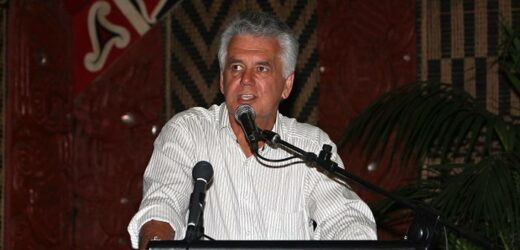OPINION:
Kia hinga ngā tōtara mārohirohi i te wao nui a Tane.
Kua whati ngā tāhuhu o te whare
E te māreikura a Kahurangi June Jackson. E te ihorei a Tākuta Moana Jackson.
E kui, e koro, haere, haere, haere atu rā.
Haere atu rā ki te atamira o ō tātou tūpuna.
Haere ki ngā tūpuna e takoto mai nā i te pō
Ahakoa kua whetūrangitia, e kore kōrua e ngaro i roto I ngā ngākau o te tini me te mano.
Ko mātou ēnei e noho mokemoke atu nei i tō kōrua wehenga atu.
Two strong Tōtara in the great forest of Tāne have fallen.
Two sturdy poles of the house have come down.
To our respected leaders, Dame June Jackson, and Dr Moana Jackson
May you both return to your ancestors.
Although you may have gone, you will both always feature in the hearts of many.
As we all continue to mourn and share stories of the legacies you both leave behind.
Mana comes in many shades, all of which exist in abundance in the wider Jackson whānau. The loss, therefore, within the span of days, of both Dr Moana Jackson and his sister-in-law Kahurangi Temuranga Batley-Jackson (June Jackson), is felt deeply within te ao Māori and beyond.
Moana Jackson was born in Hastings, one of six children to Everard (Ngāti Porou) and Janey (Ngāti Kahungunu).
After serving as prefect in his final year at Hastings Boys High School,
he studied law and criminology at Victoria University of Wellington and later undertook further study at Arizona State University. He was a renowned legal scholar with unrivalled expertise with respect to the Treaty and New Zealand constitutional law, and more broadly on indigenous rights where he found receptive audiences far beyond our shores. He served on the Indigenous Peoples Caucus of the working group that drafted the United Nations Declaration on the Rights of Indigenous People and served as a judge on the international tribunal on indigenous rights in Hawaii and Canada.
During the Bougainville peace process he advised the interim government as it established its constitutional footing.
At every point in his career, matua Moana never failed to push the boundaries of what is possible for our people – and nor would he compromise that purpose in the service of comfort or comity.
What’s striking about both Moana and June is the richness and diversity of their lives – fully engaged in the world around them; focused resolutely on the cause to which they dedicated themselves, but never at the expense of a fully textured, multifaceted life.
This is reflected in his last ever column where Moana effortlessly weaves literary references, Maori and Western intellectual traditions and command of law and history to make a searing critique both of the Government’s Covid response as it pertains to Māori and critics of that same response making bogus claims to kinship with Māori.
Published in the excellent e-Tangata, it puts on full display the supple intellect and capacity to prosecute a powerful rhetorical case with nuance and rigour.
A new generation of brilliant Maori academics and legal practitioners tread a path Moana forged, among them Dr Will Flavell, who composed the mihi above, and Natalie Coates, a partner at Kahu Legal.
“The impact that Moana had on a whole generation of Māori lawyers, myself included, cannot be overstated,” Natalie told me.
“He was a mentor that profoundly and deeply influenced not only our thinking but also many of our lives and how we saw our place and role within the law. He challenged us to be Māori lawyers – not lawyers who happened to be Māori. He tested and reframed our analysis of Māori legal issues – asking us to think deeply about colonisation, indigenous rights, constitutional change and a Te Tiriti o Waitangi consistent future for Aotearoa. He also taught me that powerful advocates can come in many different forms – including with a soft, quiet and thoughtful voice. Moana’s stories and powerful words have left a permanent imprint on the landscape of law in Aotearoa.”
Morgan Godfery, a senior lecturer at Otago University, echoes Natalie’s sentiments:
“Matua Moana was a chief and an intellectual, and most people know him for that. But what distinguished matua, especially from his Pākehā opponents who were always biting at his heels, was his kindness and grace.
“When I was a student at Victoria he was always so generous with his time, his thoughts, and his encouragement. He was generous to students at Victoria University for decades too. Everyone who met him was struck by his thoughts, his voice, and his goodwill. But above all that, he loved his mokopuna.
“That’s the last thing we spoke about. He came from such an illustrious family, and we mark the passing of Dame June Jackson this week as well. Their whānau is so staunch, so tireless, and packed with talents from intellectualism to talent on the rugby field.”
I am lucky to have known Dame June, whose late husband Bob was Moana’s brother, through a relative who worked alongside her at the Manukau Urban Māori Authority (MUMA) for many years. Every one of the many mournful words uttered at her tangi rang true – tough, fearless, no-nonsense. But she had a heart of gold and she would personally look after and manaaki those that society, even family, had given up on.
In her role as MUMA’s first chief executive, Dame June (Ngāti Maniapoto) was tireless in her advocacy for urban Māori and her readiness to take on anyone who stood in the way of the economic improvement of the community she represented.
She led the urban Māori authorities’ challenge of the Māori Fisheries Settlement allocation model, attending Privy Council hearings in London. The final settlement set $20 million aside for urban Māori of the $700 million in assets, a sum she viewed as paltry.
Among her countless other contributions, Dame June was the longest ever serving member of the Parole Board, a grim and thankless assignment that she nevertheless understood needed doing by someone with a heart like hers.
Sadness at their passing mingles with simple gratitude for the lives Moana and June lived, and for the Aotearoa, they have helped shape. That my two Māori children grow up in a country where our heritage is a source of pride, where te reo prospers, where Māoritanga, once destined to be an artifact, breathes new and vibrant life – this was neither predestined nor inevitable. It was willed into being by a generation of visionary leaders, of which Dr Jackson and Dame June are peerless exemplars.
•Shane Te Pou (Ngai Tuhoe) is a company director at Mega Ltd, a commentator and blogger and a former Labour Party activist.
Source: Read Full Article

/cloudfront-ap-southeast-2.images.arcpublishing.com/nzme/UICTRNZETOOWL6DOCU5HOBZK4I.jpg)
/cloudfront-ap-southeast-2.images.arcpublishing.com/nzme/KMFY5EA4RUN6QEOATWW5YL64JQ.jpg)

